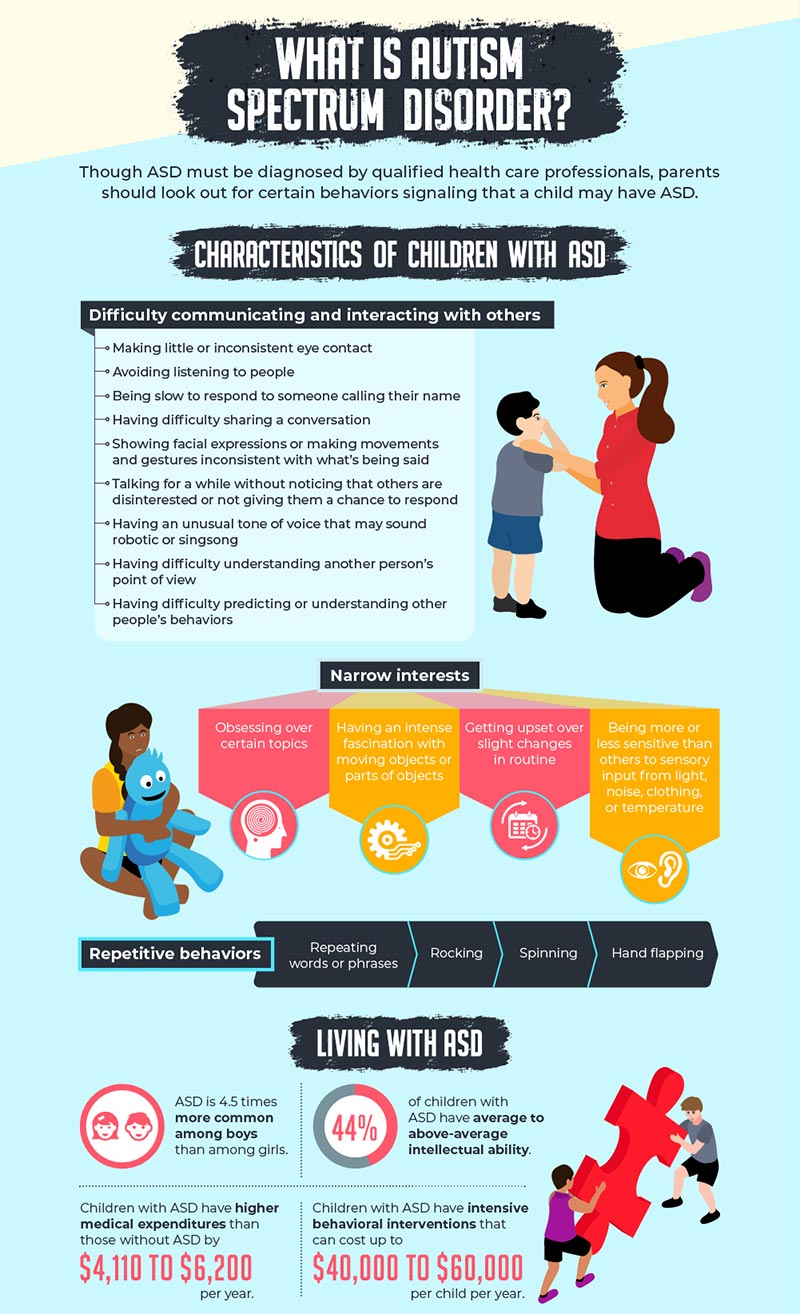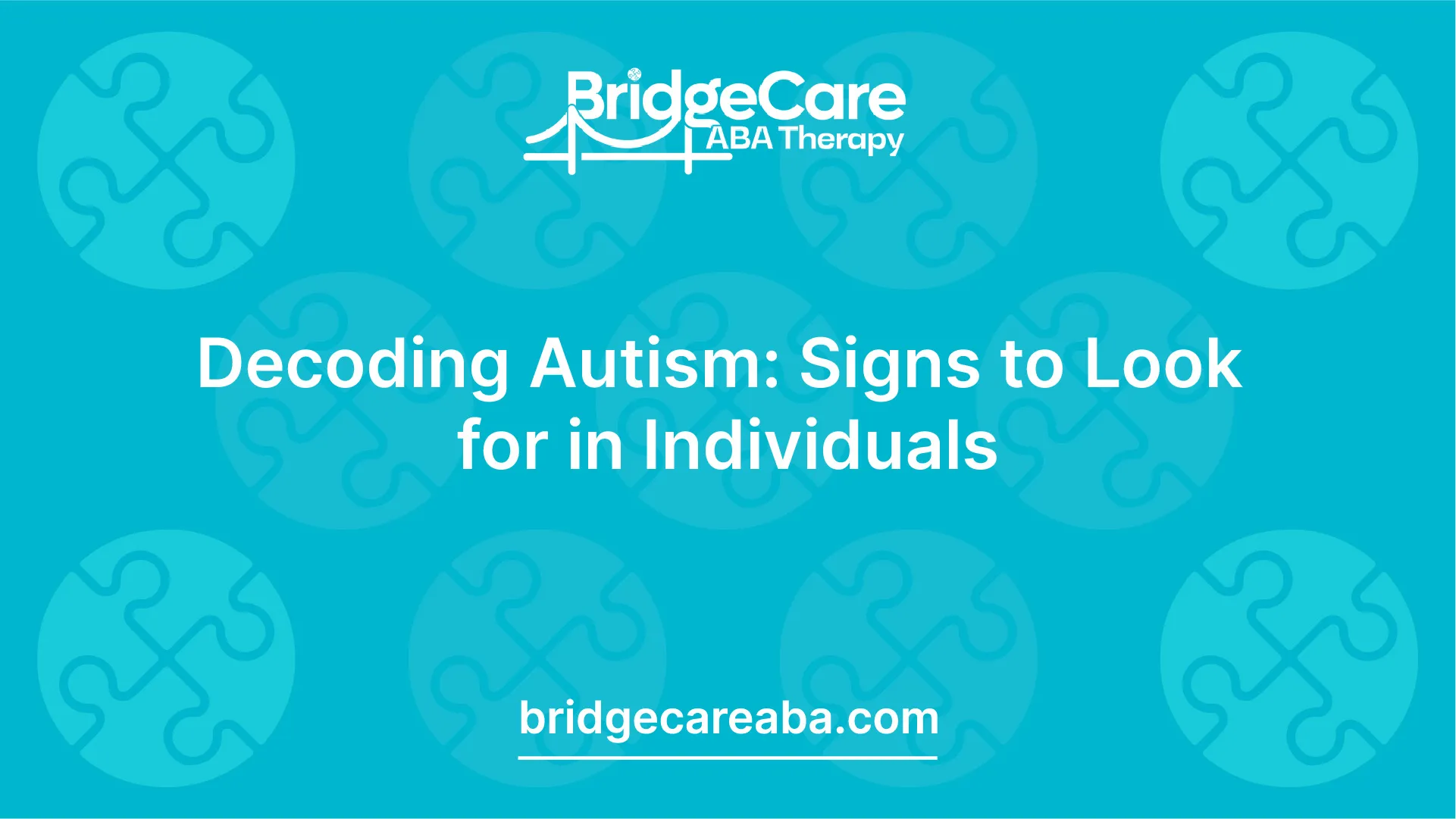How to design sensory-friendly spaces with advice from an Autism Therapist
How to design sensory-friendly spaces with advice from an Autism Therapist
Blog Article
Key Indicators and Signs to Acknowledge in Individuals With Behavior Autism
When you run into somebody with behavior autism, identifying crucial signs and symptoms is essential. In addition, sensory level of sensitivities can lead to frustrating experiences.
Difficulties in Social Interactions
When you engage with a person on the autism range, you may notice they struggle with social signs and interaction. These difficulties can make social interactions really feel frustrating for them. You might see them preventing eye get in touch with or standing too close or as well far throughout conversations, which can create misconceptions. They may not notice body language or facial expressions, making it harder for them to evaluate just how others are feeling.
Furthermore, you might locate that they prefer regimens and acquainted setups, which can restrict their desire to involve in new social situations. They might speak about their passions in excellent detail without seeing if you're interested when they do involve. This can cause discriminatory conversations that leave you really feeling disconnected. Understanding these obstacles can help you approach interactions with compassion and perseverance, cultivating an extra comfortable setting for both of you.
Trouble With Verbal and Non-Verbal Interaction

Non-verbal interaction can be much more challenging. You could see a lack of eye call or limited use gestures, which can make communications really feel uncomfortable. Faces may not constantly align with the discussion, resulting in complication about their sensations. Recognizing these indications is essential, as it assists you far better support and involve with people on the autism spectrum. By comprehending their interaction challenges, you can promote extra meaningful connections and give a more helpful setting.
Repetitive Behaviors and Routines
Communication difficulties usually accompany other signs of autism, such as repeated habits and a solid choice for regimens. You could see that individuals with autism often take part in particular, repeated actions, like hand-flapping, shaking, or duplicating phrases. These behaviors can provide comfort and a sense of control in a typically frustrating globe.
Regimens are similarly crucial; lots of people prosper when they comply with a structured routine. You might locate that adjustments to these regimens can result in significant distress. For example, if they have a daily routine of consuming breakfast at a particular time or following a particular course to institution, any disruption can create anxiousness.
Identifying these patterns aids you recognize their habits and supply support. By accommodating their need for routine and allowing recurring actions, you can create an extra comfortable atmosphere that eases their obstacles.
Sensory Sensitivities

Typical Sensory Triggers
Sensory level of sensitivities can significantly influence day-to-day live for individuals with autism, as particular stimuli usually set off frustrating responses. Common sensory triggers include loud sounds, intense lights, and strong smells. You may see that sudden noises, like alarms or sirens, create anxiousness or distress. Fluorescent lights in stores can feel uneasy and rough. Textures can also play a considerable function; harsh textiles or certain food appearances might be unbearable for you. Additionally, crowded locations can overwhelm your senses, making it tough to unwind or focus. Comprehending these triggers can help you handle your setting much better. By understanding what affects you, you can take actions to decrease pain and boost your day-to-day experiences.
Behavioral Responses Explained
Understanding your behavior responses to sensory sensitivities is essential, as they commonly reveal exactly how you connect with the world. You may additionally find yourself looking for specific sensory experiences, like deep pressure or peaceful environments, to assist ground on your own. Identifying these patterns helps you comprehend your demands far better and can guide exactly how you connect them to others.
Coping Strategies Summary
Acknowledging your sensory level of sensitivities is simply the initial step; now it's time to check out coping approaches that can aid you manage those experiences efficiently. Begin by producing a sensory toolkit customized to your demands. This can consist of noise-canceling earphones, fidget playthings, or calming scents. Establishing a structured routine can also offer predictability, decreasing stress and anxiety around sensory overload. When you really feel overloaded, take breaks in a peaceful area to collect yourself. Practicing mindfulness techniques like deep breathing can help ground you in the minute. In addition, connect your demands with those around you; having encouraging loved ones can make a huge difference. Bear in mind, locating what functions finest for you may take time, useful content so be patient and open to trying brand-new approaches.
Restricted Rate Of Interests and Focus
While several people develop a vast array of rate of interests, those with autism typically demonstrate limited interests and an intense emphasis on particular topics. You may discover that someone with autism can invest hours delving right into their preferred topic, whether it's a specific sort of train, a details motion picture, or a scientific idea. This intense emphasis isn't just a pastime; it can become a main component of their identity and social communications.
You may discover that discussions rotate around these interests, and they may battle to involve in broader topics. By comprehending and recognizing these limited interests, you can promote a helpful setting where they really feel valued and understood, allowing for more purposeful links and interactions.
Emotional Policy Problems
Individuals with autism frequently face challenges in psychological law, which can be affected by their intense concentrate on specific passions. You may discover that when an individual is deeply involved in a recommended activity, they read here can experience strong feelings, whether enjoyment or disappointment. This intensity sometimes makes it tough for them to move gears or handle their feelings when things do not go as prepared.

Variability in Developing Landmarks
When it comes to developing turning points, you'll observe that people with autism commonly reveal a large variety of variability. You might see a child excel in language abilities yet battle with social interactions.
It's necessary to acknowledge that each person's trip is one-of-a-kind. Some may create complex skills early, only to encounter obstacles later. Others may take longer to accomplish basic milestones yet after that flourish in specific locations. Observing these patterns can aid you comprehend their strengths and requires much better.
Regularly Asked Concerns
How Is Autism Detected in Children and Adults?
To detect autism in kids and grownups, specialists assess actions, interaction skills, and social communications. If a specific satisfies the standards for autism spectrum problem., they typically make use of standardized examinations, interviews, and monitorings to determine.
Exist Various Types of Autism Range Disorders?
Yes, there are different kinds of autism spectrum conditions, consisting of Asperger's syndrome and prevalent developmental disorder-not or else specified. Each kind differs in seriousness and features, so comprehending these differences can help you much better assistance individuals with autism.
What Treatments Are Reliable for Individuals With Autism?
When taking into consideration effective therapies for people with autism, you'll find choices like Applied Actions Evaluation, speech therapy, and job-related treatment. Each strategy can assist boost communication, social abilities, and day-to-day functioning tailored to private demands.
Can Individuals With Autism Lead Independent Lives?
Yes, individuals with autism can lead independent lives. With the important source best assistance, abilities training, and sources, you can aid them develop self-sufficiency, handle everyday jobs, and grow in various environments, promoting their self-reliance.
Just How Can Family Members Assistance Enjoyed Ones With Autism?
You can sustain your loved ones with autism by creating a structured environment, encouraging their interests, practicing patience, fostering communication, and promoting social skills. Celebrate their achievements, no matter how small, and build a supportive neighborhood.
Although numerous individuals on the autism spectrum can understand and use language, they frequently deal with significant challenges with both verbal and non-verbal interaction. Identifying these indications is necessary, as it assists you much better support and involve with people on the autism spectrum. You might notice that people with autism commonly involve in particular, repeated activities, like hand-flapping, rocking, or repeating expressions.Sensory level of sensitivities can significantly impact daily life for people with autism, as specific stimuli usually cause overwhelming reactions.When it comes to developing turning points, you'll notice that people with autism typically show a vast variety of variability.
Report this page